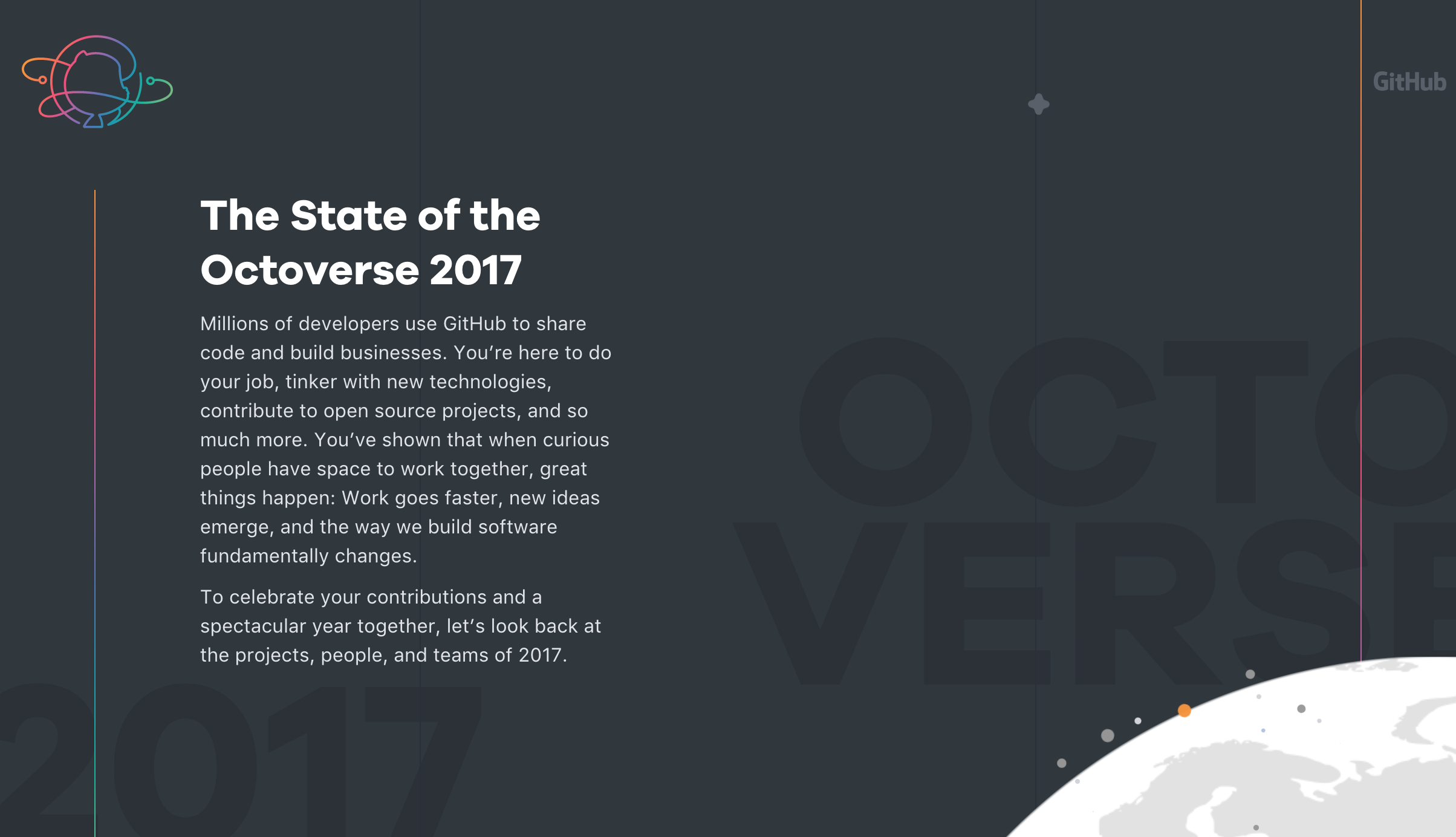The post The Natural History Museum in London opens its online doors appeared first on The GitHub Blog.
]]>Speeding up a creepy-crawly process
The museum initially developed Inselect for a simple purpose: to identify individual specimens from a drawer of samples in order to digitally categorize each. This isn’t a quick task—the Natural History Museum houses an estimated 33 million insect specimens in 130,000 drawers. Processed manually, it takes about an hour to categorize a drawer of specimens. Inselect, on the other hand, can do the same job in five to 10 minutes, depending on the complexity of the drawer.
Open source, open access
Despite its name, Inselect isn’t just for insect specimens. Researchers and archivists can use the application for all sorts of projects that require cataloguing and categorizing for digital collections. In addition to working across a range of digital collections, Inselect operates on Windows and macOS under an open source license, allowing scientists and research institutes anywhere instant access rare specimens and providing a significant boost to the Natural History Museum’s digitization plans.
The Natural History Museum is by no means short of material to digitize. Researchers have adapted Inselect to look at slide digitization and have used to catalogue around 100,000 microscopic slides. The Digital Collections Programme at the museum is looking into digitizing more than just insects; they plan to make much larger artifacts such as fossils and skeletons available online, too. The scale of these artifacts, however, presents an entirely different challenge—but one that future open source software may well be able to solve.
By open sourcing Inselect, the Museum has provided a tool for other organizations to use, too. They’ve endorsed the Science International Open Data Accord and operate an open-by-default policy on their scientific collections. One result is the University of Sheffield’s project ‘Mark my bird’—a research project on the diversity of bird bills based on birds from their collection.
The post The Natural History Museum in London opens its online doors appeared first on The GitHub Blog.
]]>The post Mission report: GitHub Universe 2017 appeared first on The GitHub Blog.
]]>Here’s a look back at who came, what they saw, and how they conquered this Universe.

What’s new in the GitHub universe
We kicked off the first day of the conference with an opening keynote and product updates from GitHub CEO Chris Wanstrath, Data Engineering Manager Miju Han, and Platform Engineering Manager Kyle Daigle.
They introduced new experiences that can help you protect your code and discover relevant projects:
- Keep track of the projects your code depends on with the new dependency graph (and soon, you’ll get security alerts and suggested fixes from your dependency graph)
- Find hand-picked resources and projects like yours with Explore
- Get smart recommendations from your new “Discover repositories” feed
And we shared a data-filled review of the projects, people, and teams of 2017 (and the last ten years) that you can explore further in this year’s Octoverse.
From Felipe Hoffa’s exploration of what we learn from 42 TB of Google code to Flora Dai’s search for efficient music discovery at Pandora, the 40 sessions that followed introduced new ideas from unexplored parts of the software universe.
Workshops
Attendees who made it to the workshops got a full day of hands-on building with leading technologies and concepts, taught by the people who know them best. They built new Electron apps, learned new command line tricks, and discussed how to make their teams more inclusive in an inspiration-rich gallery space.
After Party
We wrapped up the first day of the conference with a benefit concert supporting Maven—our nonprofit partner that empowers LGBTQ youth to network, organize, and build tech solutions for social change—on National Coming Out Day. Our headliner, Neon Trees, played their hits as more of the community met each other over food truck bites and drinks at Mezzanine.
Sponsors
Our business and community sponsors kept the recharge power, waffle cones, cold brews, juice, and inspiration flowing throughout the event. Universe wouldn’t be possible without the imaginations and contributions from these organizations.
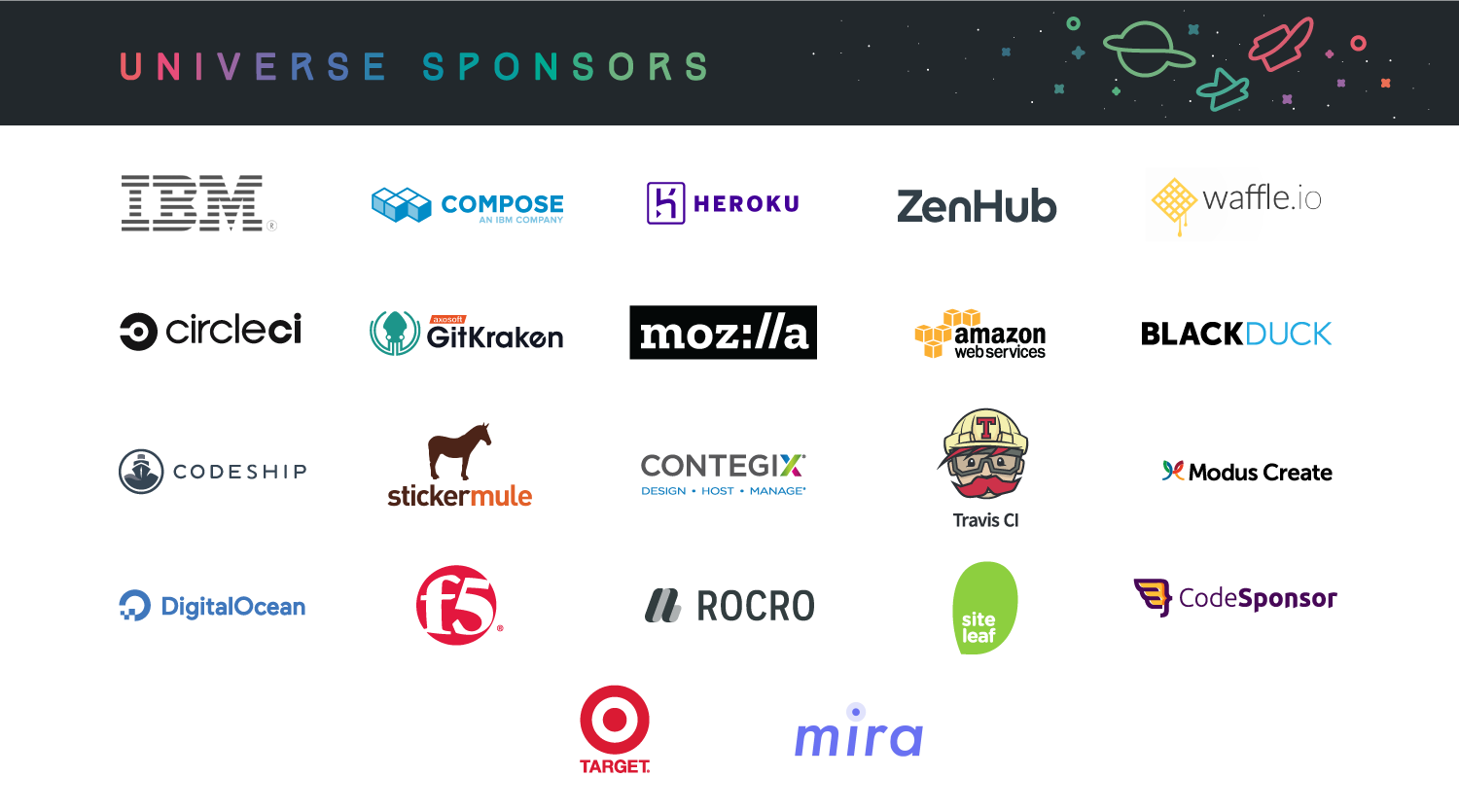
Thank you, GitHub community
Thanks for being part of 1.5 billion commits over the last decade together and for helping our third Universe take flight. If the last ten years are any indication, we’ve got a lot to look forward to. See you next year at Universe or at an event near you!
The post Mission report: GitHub Universe 2017 appeared first on The GitHub Blog.
]]>The post Announcing GitHub Constellation Tokyo appeared first on The GitHub Blog.
]]>At Constellation, you’ll learn how Japanese teams are integrating GitHub across their companies to create a better developer experience. Then meet developers who contribute to open source and their communities. You’ll also get the latest updates on where GitHub is headed, directly from our team.
Before the conference, we’re hosting a community meetup at SuperDeluxe on June 5. Check out talks on open source and community management and hang out with GitHubbers over drinks and snacks.
We hope you’ll leave Constellation with new friends and fresh ideas on how to work better with your team—and with the open source community.
Go to githubuniverse.com/constellation to get your tickets or sign up for updates!
The post Announcing GitHub Constellation Tokyo appeared first on The GitHub Blog.
]]>The post Integrations moves into pre-release with new features appeared first on The GitHub Blog.
]]>Enabling users to log in from your Integration
Users can now log in with your Integration using the OAuth protocol, allowing you to identify users and display data to them from the relevant installations. Additionally, an Integration can now make authorized API requests on behalf of a user; for example, to deploy code or create an issue. Learn more about authenticating as a user via an Integration.
Updating an Integration’s permissions
When you create an Integration, you have to specify which permissions it needs; for example, the ability to read issues or create deployments. Now you can update the requested permissions via Settings > Developer settings > Integrations, whenever the needs of your Integration change. Users will be prompted to accept these changes and enable the new permissions on their installation.
Post-installation setup
Finally, you now have the option to configure a Setup URL to which you can redirect users after they install your integration if any additional setup is required on your end.
Resources
More information on getting started can be found on our Developer Blog and in our documentation. We’d also love to hear what you think. Talk to us in the new Platform forum.
The post Integrations moves into pre-release with new features appeared first on The GitHub Blog.
]]>The post New and improved two-factor lockout recovery process appeared first on The GitHub Blog.
]]>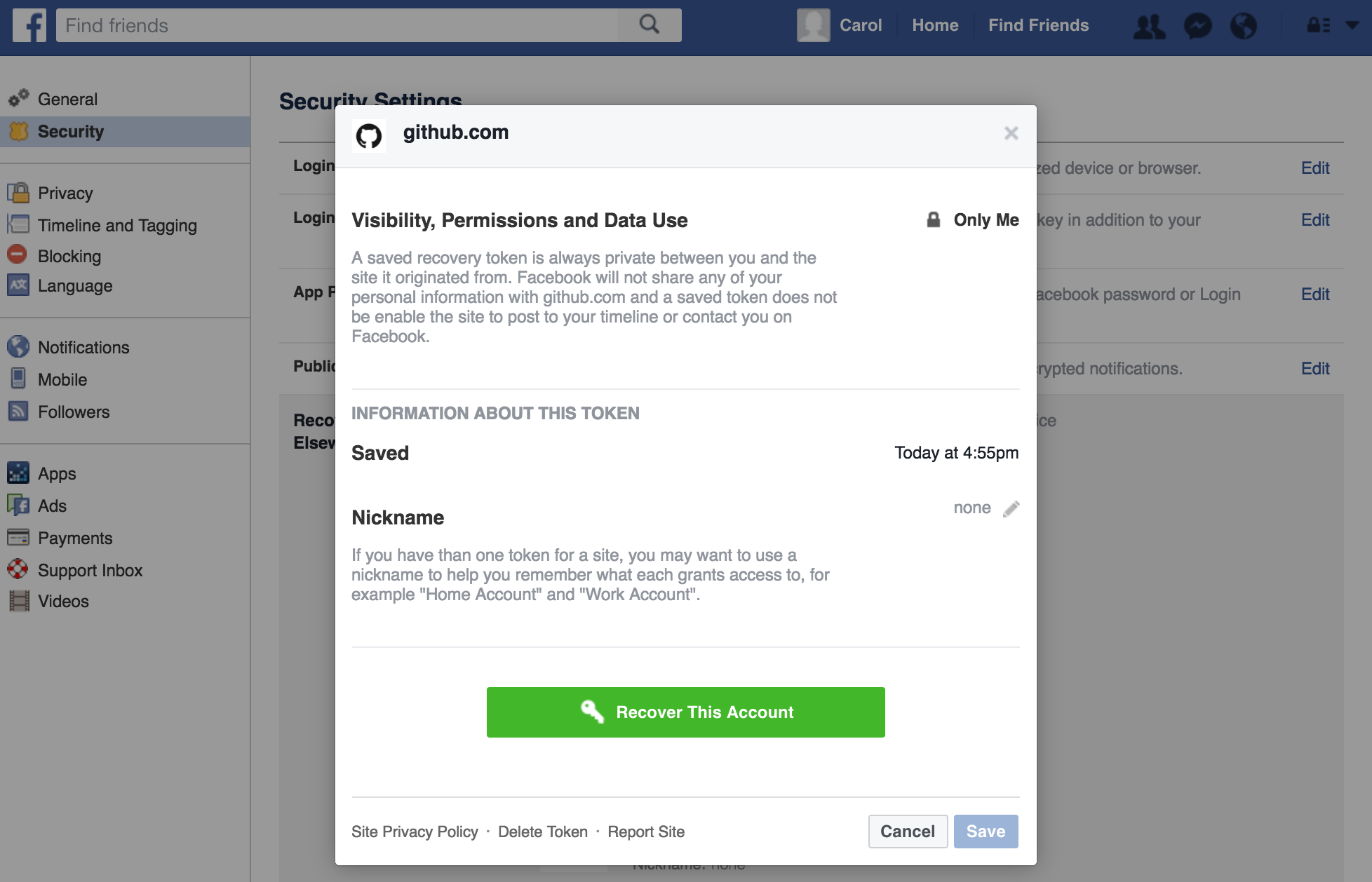
Currently, if you lose the ability to authenticate with your phone or token, you have to prove account ownership before we can disable two-factor authentication. Proving ownership requires access to a confirmed email address and a valid SSH private key for a given account. This feature will provide an alternative proof of account ownership that can be used along with these other methods.
To set up the new recovery option, save a token on the security settings page on GitHub. Then confirm that you’d like store the token. If you get locked out for any reason, you can contact GitHub Support, log in to Facebook, and start the recovery process.

The post New and improved two-factor lockout recovery process appeared first on The GitHub Blog.
]]>The post GitHub data, ready for you to explore with BigQuery appeared first on The GitHub Blog.
]]>If you’d like to find out more about what data is available and how it’s been used so far, watch this conversation between GitHub Data Analyst Alyson La and Google Developer Advocate Felipe Hoffa. You’ll learn the story behind the datasets and what types of analysis they make possible. You’ll also see how we’ve visualized data with Tableau and Looker.
There’s a lot of data out there, but it’s all available through BigQuery in two large data sets. The original, community-led GitHub Archive project launched in 2012 and captures almost 30 million events monthly, including issues, commits, and pushes. Last year, we worked with Google to release The GitHub Public Data Set, separate tables with information on all projects that have open source licenses, including commits, file contents, and file paths.
You can also use the GH torrent project to complement the existing datasets with additional metadata.
We ran a list of queries on the datasets above to create the open source section of our Octoverse report, but anyone can run an analysis. Here are the results of some of the queries run so far.
- “This should never have happened” has appeared in code comments more than a million times (hear this data point for yourself in this Changelog episode)
- Where does open source happen? GitHub top countries shares which countries have the most open source developers per capita
- How reliable is GitHub? Felipe runs a query to find out in GitHub reliability with BigQuery
- There are a lot of feels in open source. Geeksta examines how emotions are expressed in GitHub commit messages
- Are bigger pull requests better? Jessie Frazelle analyzed the top 15 projects on GitHub in terms of pull requests opened vs. pull requests closed
Happy exploring!
The post GitHub data, ready for you to explore with BigQuery appeared first on The GitHub Blog.
]]>The post Mission Report: GitHub Universe appeared first on The GitHub Blog.
]]>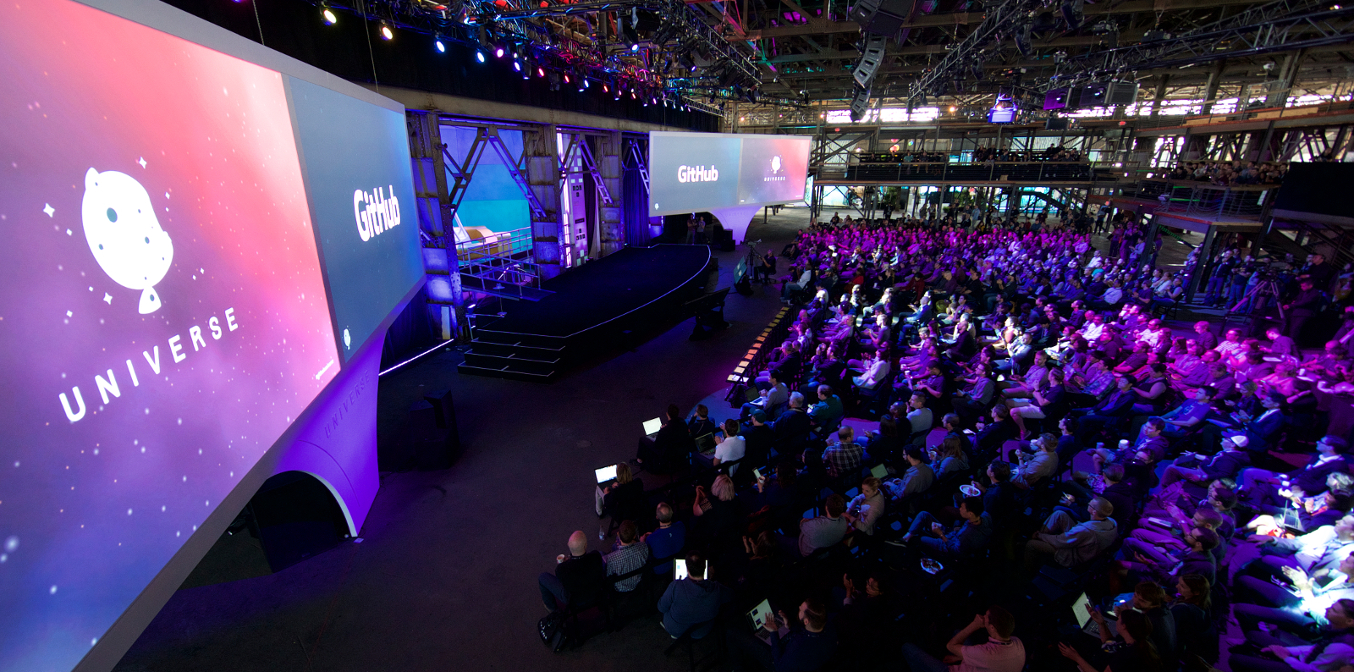
On September 14 in San Francisco, more than 1,500 developers helped us kick off GitHub Universe and share stories about open source, workplace best practices, and how the GitHub Community builds software. In case you missed it, here are some highlights, along with the new features and community updates announced:
We started day one with a keynote by GitHub CEO Chris Wanstrath, who shared a few brand new developments from around the GitHub Universe. We were also joined by CEO of Black Girl’s Code Kimberly Bryant and White House Senior Technology Officer Alvand Salehi. For more details, check out the launch post.
On day two, we heard a keynote from GitHub’s VP Social Impact Nicole Sanchez, Dr. Kortney Ziegler, and David Molina of Operation Code who shared their thoughts on training new developers and expanding opportunities to participate in technology for people from all backgrounds
Code Review
Our new Reviews improves code review on GitHub and helps you share the weight of building software. Reviews allow you to comment on specific lines of code, formally “approve” or “request changes” to pull requests, and more. Our initial changes are only the first step of a much greater roadmap toward faster, friendlier code reviews.
Projects
With Projects, you can organize work from your GitHub repositories and integrate project management into your development cycle without skipping a beat (or even opening a new browser tab).
Although we’ll quickly add to Projects, our initial release currently supports:
- A New Projects tab–at the same level as Code, Issue, Pull Requests within a repository–that lists all of your projects
- Workflow columns that you can name and reorder
- Cards that you can drag and drop between columns pointing to issues, Pull Requests, or notes
- Tools built on top of Projects by some fantastic partners, including Waffle.io and ZenHub
Platform updates
We launched a few things to make integrating with GitHub a better, more enjoyable experience, including a public Platform Roadmap and the GitHub Platform Forum. We also launched two new projects to make our platform more flexible:
- Integrations Early Access: a new model that provides better ways for tools to extend and integrate with GitHub
- The GitHub GraphQL API Early Access: a GraphQL API that simplifies product development
Breakout sessions
Our breakout sessions this year covered everything from product updates and applications to building more diverse and inclusive engineering teams. All of the talks from the general sessions are ready for you to watch from home—and recordings of the Launch, Flight, and Orbit breakouts will be available soon.
Benefit concert
We ended Monday at The Masonic with the Big Bang—a benefit concert for Black Girls Code. Artist and actor COMMON headlined with support from Lion Babe. Head to www.blackgirlscode.com to learn more about BGC’s work and find out how you can help them reach their mission to teach one million girls to code.
Sponsors
GitHub Universe would not have been possible without the support of our sponsors, who provided food, juice, coffee, bubble tea, and beautiful art installations for our enjoyment.
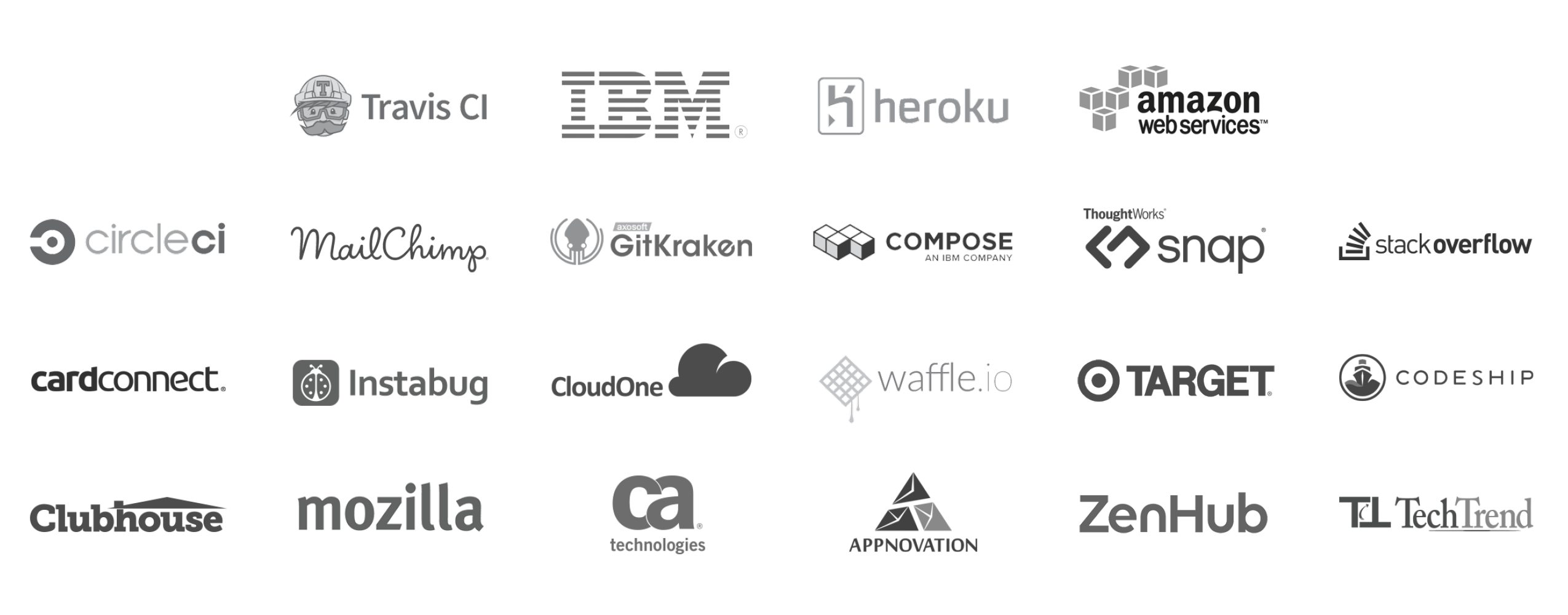
Thank you
And finally, thank you to our community for making all of this possible—and helping GitHub Universe take flight.
The post Mission Report: GitHub Universe appeared first on The GitHub Blog.
]]>The post Watch GitHub Universe Live: September 14 and 15 appeared first on The GitHub Blog.
]]>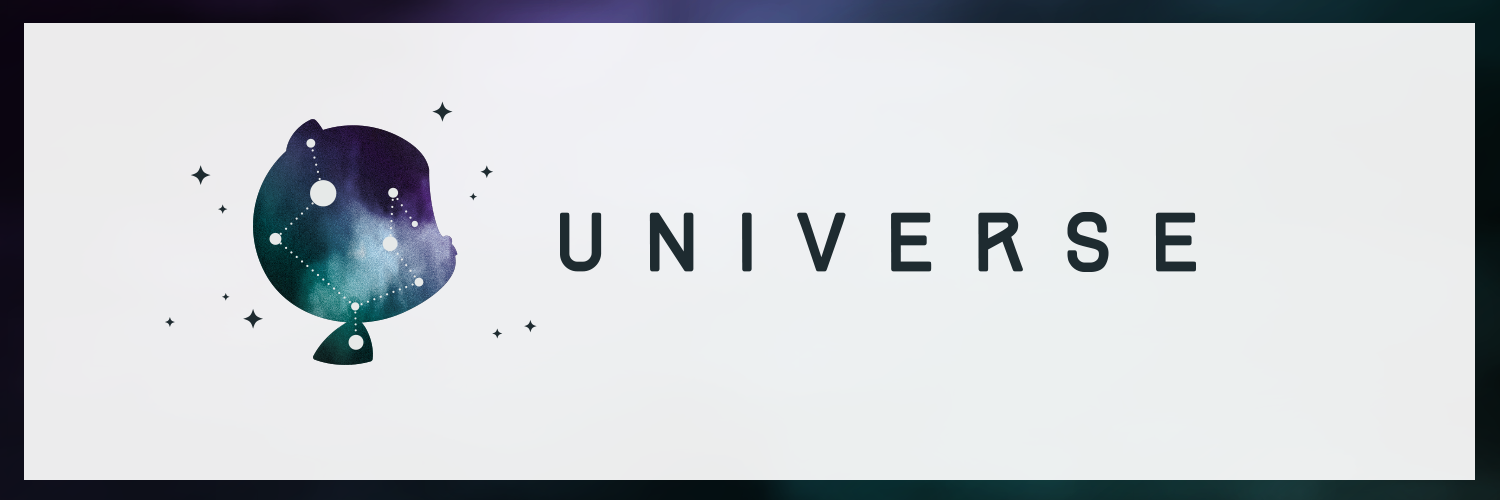
Couldn’t make it out to San Francisco for GitHub Universe this week? We’ve got you covered. Every session from the main stage to breakout sessions are being recorded and live streamed on the GitHub Universe website starting today at 10AM. This is your chance to hang out with all of our featured speakers from home.
Highlights
- Opening keynote from Chris Wanstrath, CEO and Co-Founder, GitHub
- Roman Mars will be doing his 99% Invisible podcast live from our stage
- Fireside Chat with Bret Taylor, CEO and Co-Founder, Quip
- Hear how The White House builds trust through data transparency from Clarence Wardell, Member of USDS
- Join Benjamin, AI screenwriter of Sunspring, along with his human chaperones Oscar Sharp and Ross Goodwin, as we explore the potential of writing machines and augmented creativity
- Learn about Open Source challenges from GitHub, Salesforce Desk, Netsuite, and more
- Learn how your company can decrease time to market and increase ROI with InnerSource from Bloomberg, Line, Hewlett-Packard Enterprise, Walmart, and IBM
- Hear how to actually make a difference with diversity and inclusion
Watch now
And much more. Head over to to the live stream now to check out the full lineup.
The post Watch GitHub Universe Live: September 14 and 15 appeared first on The GitHub Blog.
]]>The post Hands-on at GitHub Universe: interactive art, cozy lounges, and more appeared first on The GitHub Blog.
]]>
Make the most of your time at GitHub Universe by visiting an array of interactive projects, exhibits, and sessions—from art installations to one-on-one time with GitHub experts.
Ask GitHub
Want some quality time with GitHub speakers, Services team members, and open source experts? Drop by the Ask GitHub lounge, located inside the doors, directly to the left as you enter the conference. In this area, you can find:
GitHub Speaker Office Hours
GitHub speakers will adjourn to the Ask GitHub lounge after their talks, where they’ll be available to answer questions. Swing by with yours.
Ask Services
You can stop by the Ask Services booth in the Ask GitHub lounge to speak with a member of the Professional Services team. Sign up in advance for a free, 30minute session here. Space is limited.
Open Source Help Desk
The open source community is well-known for their sociability online, but sometimes it’s nice to chat in-person too. Stop by the Ask GitHub lounge anytime to meet up with some of GitHub’s resident open source experts and enthusiasts.
Universe Lounges
Open all day, lounges are the perfect place to rest, recharge and connect with your fellow attendees throughout the conference. Swing by to interact with some of our awesome sponsors and learn more about what they’re up to.
Purple Lounge
The Heroku booth will be showing off Heroku Flow, a continuous delivery methodology and tooling that can help you iterate faster and bring in the whole team to produce higher quality software.
Blue Lounge
Meet the IBM Bluemix team at the Blue Lounge. They’ll have the ever-popular Bluemix foosball table, plus other demonstrations of Bluemix.
Green Lounge
Swing by the Travis CI Developer Lounge to chat about their latest Enterprise release and find out how they can help improve your CI/CD workflow. Talk to their engineers and get instant help on how to improve and speed up your build pipeline.
Orange Lounge
Talk to a Solutions Architect at the AWS outdoor parklet about your current challenges, your next project, or that crazy idea you have always wanted to try out in the cloud. Learn how you can use GitHub and AWS to take the friction out of your CI/CD pipeline and get your infrastructure ready to scale for your next million users.
Demo Desk
The Demo Desk will be open for in-depth demonstrations on everything from robots to testing automation.
Jibo, the world’s first social robot for the home is built on Atom and runs on Electron. The Jibo team will demo their Software Developer Kit (SDK), and show you how to push Jibo Skills (robot applications) to the little guy himself.
CircleCI will be running demos-on-demand, so stop by to learn how you can automate your testing and development cycle.
Compose.io will be showing off provisioning and app connection.
11:30am-1:00pm – Jibo
1:15pm-2:45pm – CircleCI
3:00pm-4:30pm – Compose.io
Art Installations
And finally, don’t miss the spectacular art installations created by local artists—from a gigantic balloon Kraken, to a vibrantly illuminated wall and colorful custom mural. These photo-worthy moments are brought to you by your friends at Axosoft, CircleCI and Mailchimp.
The post Hands-on at GitHub Universe: interactive art, cozy lounges, and more appeared first on The GitHub Blog.
]]>The post The 2016 Dodgeball Tournament raised $50,045 appeared first on The GitHub Blog.
]]>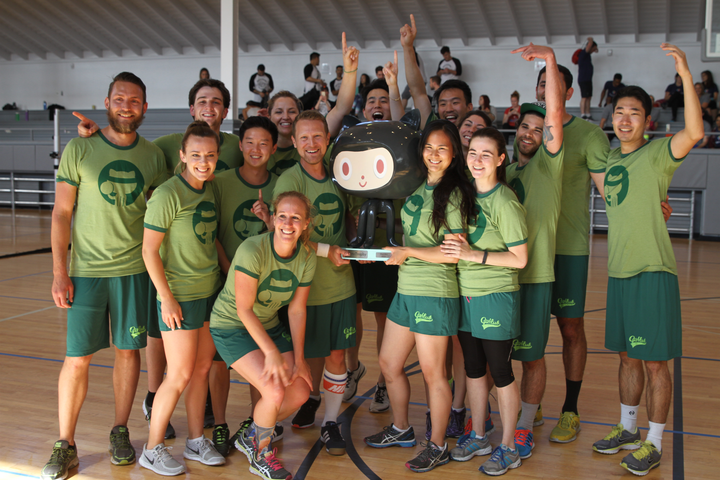
Best of all, we raised $50,045 for these five San Francisco nonprofits:
- At the Crossroads (Youth Homelessness)
- Causa Justa :: Just Cause (Tenants Rights/Gentrification)
- One Degree (Social Services/Poverty-fighting Resources
- Precita Eyes Muralists (Arts)
- Californians for Justice Education Fund (Educational Justice
Here’s how you can continue to support our local community, even though the tournament is over:
Get to know the organizations—click on the links above to view the nonprofits’ homepages and see how you can help them out. We’re still accepting individual and company donations through Brightfunds. All funds received will be distributed across the five nonprofits.
You can also check out pictures from tournament day by visiting: https://githubdodgeball2016.shutterfly.com/
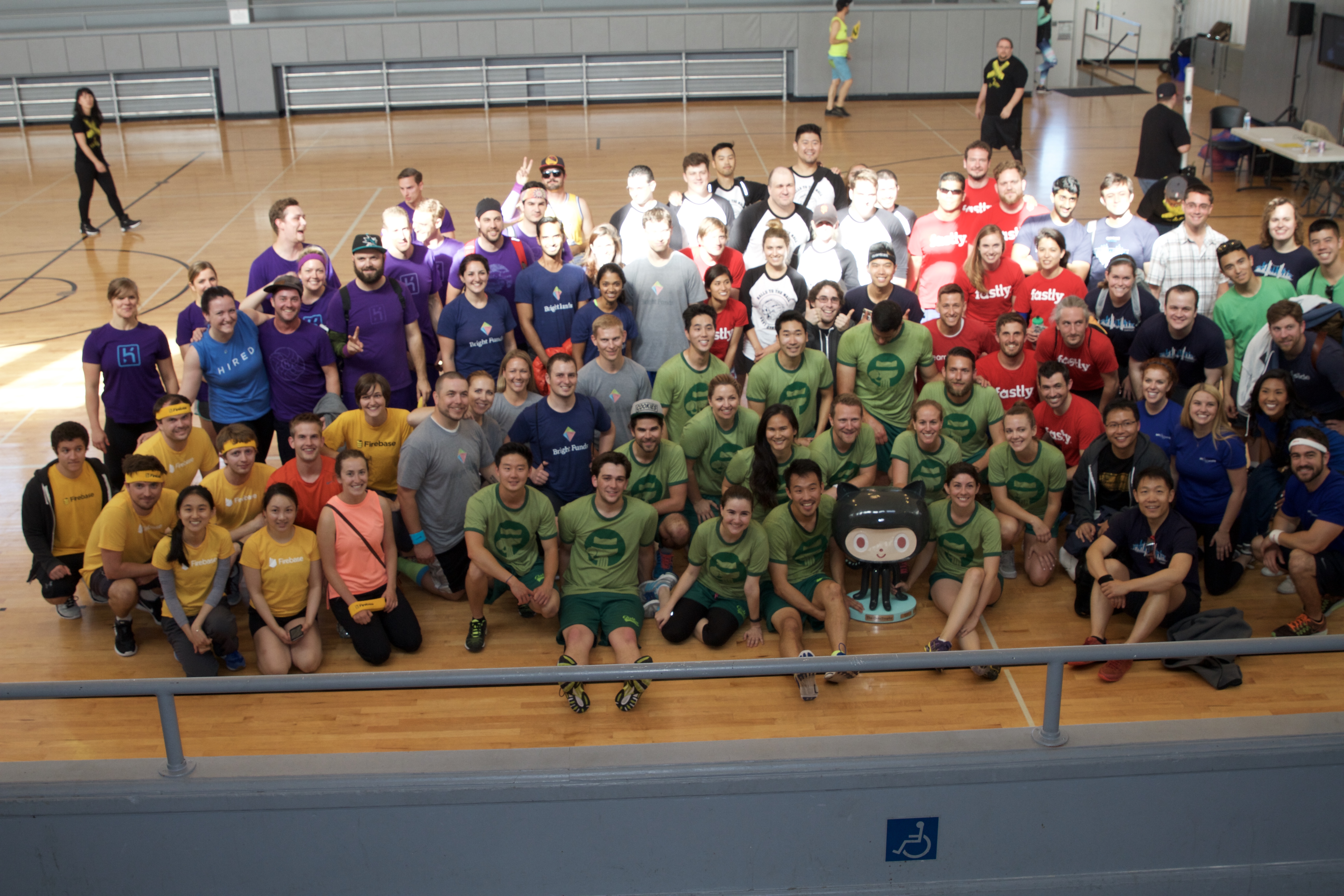
Again, thank you to all our teams:
- GitHub
- Heroku
- Betts Recruiting
- Hired
- Fastly
- Westfield Labs
- Firebase/Google
- Quantcast
- Brightfunds
- Goldman Sachs
The post The 2016 Dodgeball Tournament raised $50,045 appeared first on The GitHub Blog.
]]>